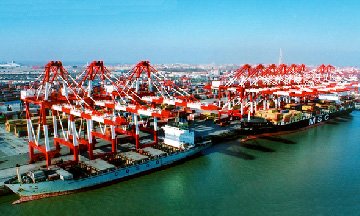Port Facility Security Officer (PFSO) Training Course
| Date | Format | Duration | Fees | |
|---|---|---|---|---|
| 05 May - 09 May, 2024 | Live Online | 5 Days | $2050 | Register |
| 10 Jun - 14 Jun, 2024 | Live Online | 5 Days | $2050 | Register |
| 07 Aug - 09 Aug, 2024 | Live Online | 3 Days | $1400 | Register |
| 23 Sep - 04 Oct, 2024 | Live Online | 10 Days | $4095 | Register |
| 14 Oct - 18 Oct, 2024 | Live Online | 5 Days | $2050 | Register |
| 16 Dec - 27 Dec, 2024 | Live Online | 10 Days | $4095 | Register |
Course Overview
What is the job of a port facility security officer?
Another sensitive area of security concern is the port facility; due to the traffic – human and goods – present at the site, adequate security is needed. Port facility security officers make sure that the facility is completely protected from any kind of threats. They are expected to be trained appropriately to maintain the needed protection for the assets on site.
How is this PFSO course impactful?
This course provides a deep learning experience about port facility management, especially when it concerns security. Areas covered in this course include risk assessment of potential threats and how to mitigate against such security concerns.
This Zoe training course empowers you with the needed guidance about the protection of the port facility. In addition, it allows participants to understand the role of a security officer in managing the affairs of a port and design a strategic plan for managing any potential security challenges.
Course Objectives
This training course by Zoe Talent Solutions aims to achieve the following objectives:
- Conducting an initial assessment of the port facility’s security
- Assembling, maintaining, and implementing the port facility security plan
- Enhancing port facility personnel’s security awareness and alertness, including training
- Notifying authorities; preserving records of incidences that jeopardise the facility’s security
- Coordination with relevant security services
- Assuring the appropriate operation, testing, calibration, and maintenance of security equipment
Training Methodology
Experts and professionals teach this course to introduce learners to the risks present at the port facility and how to mitigate risks. During this course, the participants gain more than theoretical knowledge as they handle case studies and scenarios to reinforce learning.
Zoe Talent Solutions provides an effective methodology to deliver course content such as the Do-Review-Learn-Apply methodology, giving learners hands-on experience and practical skills. In addition, there is more retention of knowledge and translation to context-specific skills with an effective teaching methodology.
Organisational Benefits
Ports and organisations that allow their personnel to take part in this course by Zoe Talent Solutions will benefit in the following ways:
- Adequate and recent knowledge about security threats present at the port
- Design a strategic plan of action to create a preventive mechanism for security breaches at the port
- Effective record and documentation system that accounts for all the operations at the port
- Creating barriers at different parts of the port to prevent or restrict movement
- The effective monitoring system of human and goods traffic in and out of the facility
- Well-trained personnel that can respond to security threats at the port facility
- Rapid response to security breaches and the threat or any external influence
- Innovative alarm or alert system to signal disruption or breakdown of security
- Familiarity of personnel with routine drills aimed at better protection of the facility
Personal Benefits
Port personnel who participate in this course can gain the following:
- Certificate of training at the end of the program to indicate competence
- Advance technology about challenges that come with protecting a port facility
- Ability to design an effective screening methodology to prevent the breach of security
- Effective management of port transportation services and appropriate coordination system
- Proper handling of sensitive information and security-related issues
- Creation of appropriate communication channels that can be used for transmitting sensitive information
- Risk assessment and checklist completion for the entire facility
- Ability to use available communication equipment effectively
- Be able to identify weapons and foreign/dangerous devices
Who Should Attend?
- Shore-based personnel who manage day-to-day activities at the port
- Law enforcement officers are one of the first lines of defence against disorderliness or threats at the port
- Shore manager responsible for making decisions that concern the operation at the port and may affect security management
- Private security in charge of the security of different aspects of the port or individuals at the port
- Transport managers responsible for the movement and logistics of goods across the port
- Any other professionals interested in port facility security
Course Outline
Module 1:Introduction to ISPS Code and Legislation
- The International Ship and Port Facility Security (ISPS) code
- Conduct and legislation
- Current threats facing ports and shipping
- Logistics
- Security threat
- Cyber threat
Module 2:Legal Requirements and Responsibilities
- Introduction to statutory instruments
- Regulations
- International conventions
- Security organisations and agencies
- Port security regulations
- Handling sensitive information and communication
- Responsible agencies and persons
- Government
- Shipowners, operators, managers
- Port facility security officer
- Port facility personnel with security duties
- Company security officer
- Shipmasters
- Other security personnel at the facility
Module 3:Security Equipment
- Emergency centre
- Private emergency centre
- Government provision centre
- Alarm centre
- Detection systems
- Warning and alarm systems
- Interior detection system
- Exterior detection system
- Closed Circuit Television (CCTV)
- Metal detectors and scanners
- Access control systems
Module 4:Person Screening and Goods Inspection
- Person screening
- Port security officer screening
- Personnel with a long-term appointment
- Third parties
- Visitors and suppliers
- Identity check
- Non-discriminatory basis
- Person inspection
- Body searching
- Methods of checking
- Non-intrusive inspections
- Inspection of goods
- A routine check of cargo
- Company seal
- Tracking and tracing
- Identification
- Authenticity
- Recognition of valid identity documents
- Passports within regional communities
- International communities
- Driving licenses
- Access control
Module 5:Weapons and Ammunition
- Legislation against illicit trafficking of weapons
- UN firearms protocol
- Legislation guiding the acquisition and possession of weapons
- Weapons and ammunition act
- Permits (International laws)
- Explosives
Module 6:Dangerous Commodities
- Definition of dangerous goods
- International codes guiding carriage of dangerous goods
- Classification of dangerous goods
- Materials
- Articles
- Substance
- Transportation of dangerous goods
- Procedure for carrying dangerous goods
- Transport document
- Proper identification
- International labelling codes
Module 7:Security Risk Assessment and Port Facility
- Risk assessment
- Principles
- Tools and checklists
- Assessment basics
- Cyber security
- Port facility security, systems and equipment
- Limitations of equipment
- Maintenance and calibration of security equipment and systems
- Port Facility Security Assessment (PFSA)
- Design and implementation of a security plan
- Restricted areas – stores, baggage controls, freight and cargo
Module 8:Security Management
- Port security committees
- Collaboration
- Ship and port interfacing
- Maintenance of port security
- Inspections and audits
- Security duties and responsibilities
- Declaration of Security (DOS)
- Private security services
Module 9:Security Training, Preparedness and Drills
- Training and drills in line with the port facility security plan
- Instructional techniques
- Crowd and crises management
- Dealing with media
- Security audits
- Inspections
- Documentation
- Record
- Reporting
- Reviews











